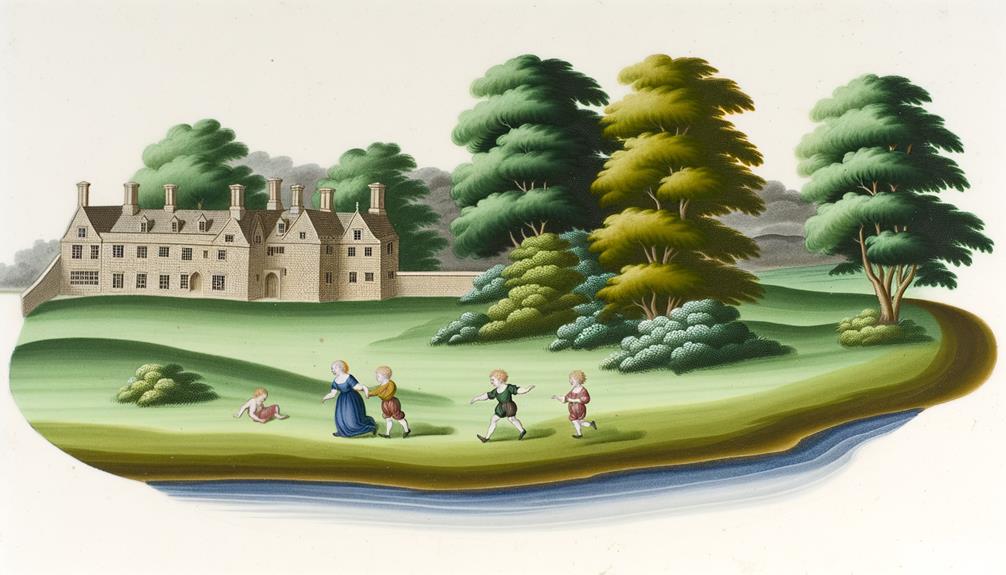Bradley Name Meaning and Origin
The name Bradley originates from Old English, combining 'brad' (broad) and 'leah' (wood or clearing), signifying a geographical feature common in the Anglo-Saxon period. Historically, it is found in medieval charters and the Domesday Book of 1086, highlighting its significance in rural settlements and the feudal economy.
Mainly seen in Yorkshire, Lancashire, and Staffordshire, the name spread globally through migration. Notable individuals named Bradley include General Omar Bradley and Avery Bradley.
The name's popularity surged post-World War II but has seen a steady decline in recent decades. Discover further nuances of its rich legacy and evolution.

Key Takeaways
- The name Bradley originates from Old English, combining 'brad' (broad) and 'leah' (wood/clearing).
- Historically, Bradley referred to expansive arable land or woodland clearances in rural England.
- The name was common in the Anglo-Saxon period and appears in medieval charters and the Domesday Book.
- Bradley has seen varying popularity, with a notable increase post-World War II, peaking in the 1950s-1960s.
- It has spread beyond England to countries like the US, Canada, and Australia through migration.
Etymology of Bradley
The etymology of Bradley traces its roots to Old English, deriving from the words 'brad' meaning 'broad' and 'leah' meaning 'wood' or 'clearing.' This combination of terms suggests that the name Bradley originally described a geographical feature characterized by a wide, open space within a forested area.
Such naming conventions were common during the Anglo-Saxon period, reflecting the landscape's physical attributes. Investigating early records, one finds that the name Bradley was often associated with rural settlements and agricultural communities.
The descriptive nature of the name highlights a practical approach to place-naming in early medieval England, wherein names served a functional purpose, providing clear, locational identifiers that were essential for navigation and land management in a mainly agrarian society.
Historical Significance
Throughout history, Bradley's significance can be observed in its frequent appearance in medieval charters and land transactions, underscoring its role in the socio-economic fabric of rural England.
The name, derived from Old English elements 'brad' (broad) and 'leah' (woodland or clearing), often designated expansive areas of arable land or significant woodland clearances. These Bradleys were pivotal in feudal economies, providing agricultural produce and serving as local administrative centers.
Records from the Domesday Book of 1086 highlight multiple locations named Bradley, revealing their importance in Norman England's landholding structures. Additionally, the consistent reference to Bradley in legal documents and estate records through centuries illustrates its enduring relevance in England's agrarian history.
Geographical Distribution
Analyzing the geographical distribution of the name Bradley reveals its prevalence mainly in England, with notable concentrations in counties such as Yorkshire, Lancashire, and Staffordshire. Historically, these regions have been significant due to their agricultural and industrial developments, which may have influenced the local adoption of the name.
The surname Bradley is derived from Old English, meaning ‘broad meadow,’ and was likely used to describe individuals residing near such landscapes. Over time, the Bradley name also spread to other English-speaking countries, including the United States, Canada, and Australia, primarily through migration. In the United States, the Bradley surname can be traced back to early English colonists and settlers. Today, it is a common surname with a rich history and heritage. The Austin name meaning, on the other hand, is of Latin origin, derived from the name ‘Augustine’, meaning ‘majestic’ or ‘venerable’. The Austin surname has also spread to various English-speaking countries and is another example of the diverse origins of surnames. In the United States, the Austin name can be traced back to the early colonial period, with individuals bearing the surname playing a significant role in the country’s development and history. Today, the Austin name is widely recognized and has been passed down through generations, carrying with it a sense of pride and tradition. Like the Bradley surname, the Austin name reflects the diverse linguistic and cultural influences that have shaped the English language and its surnames over time.
Today, the name continues to hold a presence in both urban and rural areas, reflecting its enduring historical roots and widespread geographical reach.
Famous People Named Bradley
Building on the widespread geographical reach of the Bradley name, numerous individuals bearing this surname have made significant contributions in various fields, including literature, sports, and politics. Notable figures such as the American writer Marion Zimmer Bradley, known for her works in the fantasy genre, and the Canadian basketball player Avery Bradley, who has excelled in the NBA, exemplify the diverse areas of achievement. Additionally, General Omar Bradley, a distinguished U.S. Army officer in World War II, and Bill Bradley, a former U.S. Senator and professional basketball player, further underscore the name's prominence.
| Name | Field |
|---|---|
| Marion Zimmer Bradley | Literature |
| Avery Bradley | Sports (Basketball) |
| General Omar Bradley | Military |
| Bill Bradley | Politics/Sports |
These individuals highlight the enduring legacy and versatile impact of the Bradley name.
Popularity Trends
The popularity of the Bradley name has fluctuated over the centuries, influenced by cultural, historical, and demographic shifts. During the 19th and early 20th centuries, the name saw moderate use, reflecting broader naming conventions of those eras.
Post-World War II, Bradley experienced a surge in popularity, particularly in English-speaking countries, coinciding with the rise of notable public figures and changing societal trends.
- 1950s-1960s: Marked increase in usage, linked to popular culture.
- 1970s-1980s: Continued popularity, often ranking in the top 100 names.
- 1990s: Gradual decline in usage, as newer names emerged.
- 2000s-present: Steady decline, but retains a classic appeal.
These trends illustrate the dynamic nature of name popularity, shaped by various external factors.
Cultural Impact
Through its historical journey, the name Bradley has left a significant cultural footprint, reflecting societal values and shifts across different eras. Originally an Old English surname meaning 'broad clearing,' Bradley evolved into a popular given name, showcasing its versatility. Its influence spans literature, media, and sports, highlighting the name's adaptability and enduring appeal. For instance, notable figures such as Bradley Cooper in film and William Bradley Pitt (known as Brad Pitt) have solidified its presence in popular culture. Additionally, the name's prevalence in various domains underscores its broad cultural resonance.
| Era | Notable Figure | Cultural Domain |
|---|---|---|
| Modern Era | Bradley Cooper | Film |
| 20th Century | Brad Pitt | Entertainment |
| Historical | General Omar Bradley | Military |
Such examples demonstrate Bradley's significant and varied cultural impact.
Conclusion
In summation, the name Bradley, with its roots deeply entrenched in the Old English language, has traversed centuries of history, geography, and culture.
Despite its relatively unremarkable etymology, its bearers have often found themselves in the annals of fame.
Ironically, while the name's popularity trends may ebb and flow, its cultural impact remains steadfast, proving that even the most ostensibly mundane names can leave an indelible mark on society.






